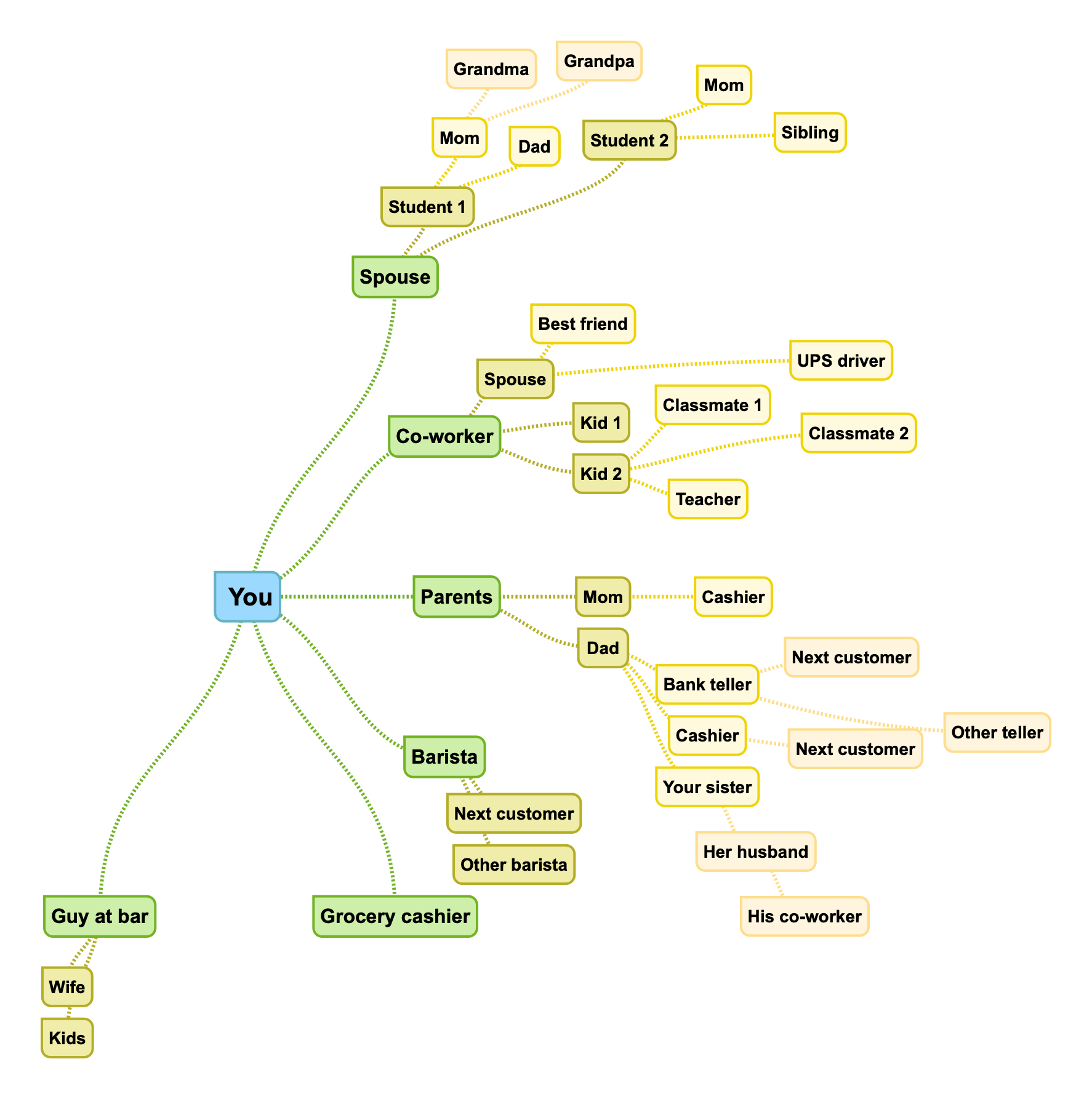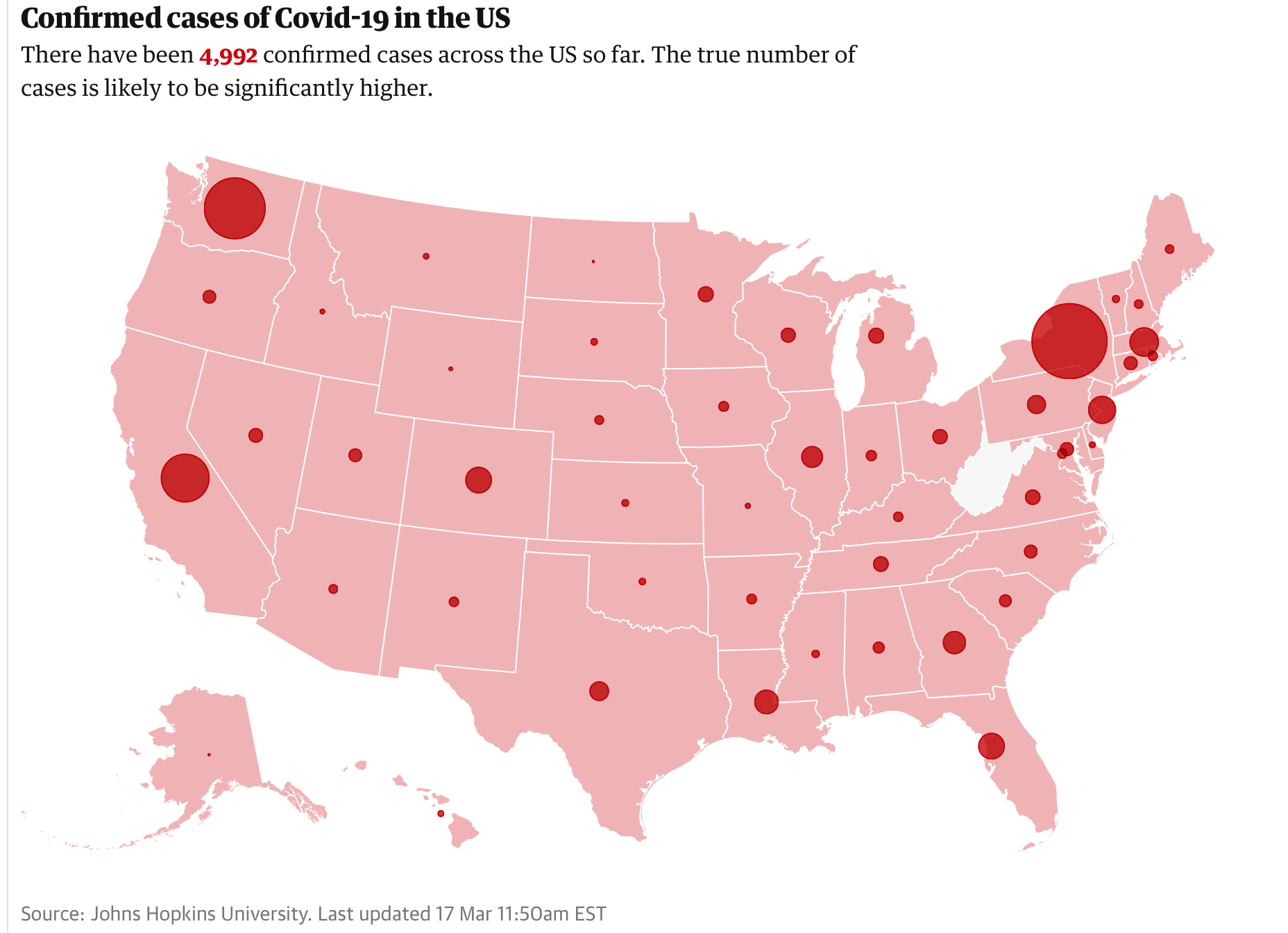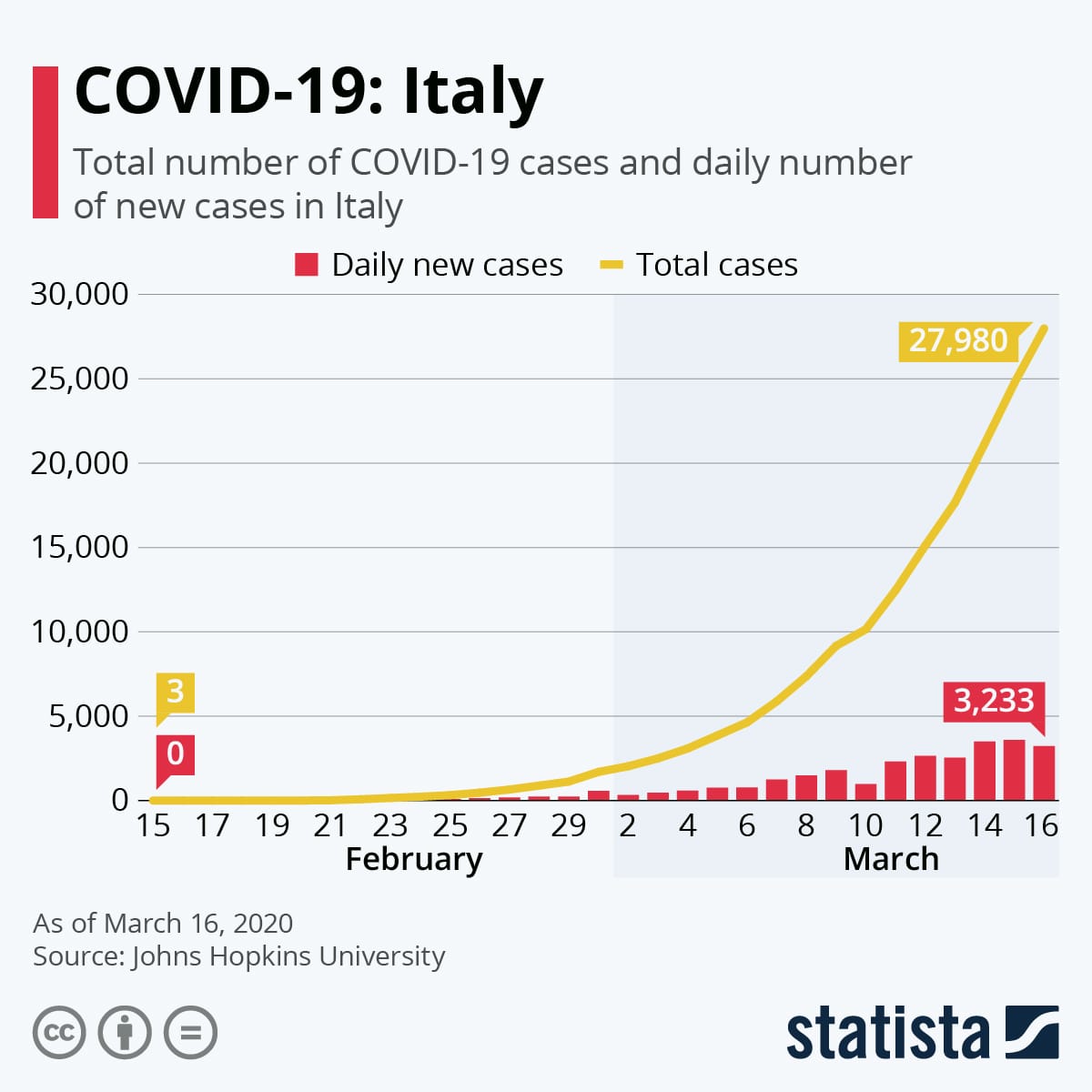Several friends tell me we are overreacting to the Coronavirus pandemic. Others say we are too complacent. So, which is it?
When dealing with an epidemic, we need to consider two things:
- Current numbers are not very useful.
- Effects are non-linear.
Beware Current Numbers #
The first argument I hear from those who wish we’d just go on with life as usual involves current statistics: number of confirmed cases, number of dead, etc.
“I have a better chance of being in a car accident than dying from Coronavirus,” someone said.
It’s true. A 30-something-year-old man is far more likely to die of a mishap than of Coronavirus, with its measly 2% mortality rate. So why worry?
Worry because car accidents have no relationship to infectious diseases. Car accidents don’t kill our relatives who aren’t involved.
Imagine, though, that your parents could receive the same injuries you receive even if they’re “safely” at home. And, then, your dad’s Knights of Columbus brothers suffer the same injuries or death just because they attended a meeting with him the night after your accident. And your mom’s sister dies because the two had coffee together an hour after your accident.
Imagine a car accident that, somehow, affected people in this pattern:

Sure, the younger, healthier people have no injuries. But as the person’s age increases, the injuries become more severe. Many die. And they die because you chose to drive. Or you ran a red light. Or you looked at your phone just as the driver in front of you slammed on his brakes.
If such an accident happened, with all of its rippling consequences, would you somehow blame yourself?
Now, if you go about business as usual and 65-year-old relative dies of coronavirus in two weeks, how will you feel?
It’s not about you the way a car accident is.
The difference between infectious diseases and accidents is that the physical damage of an accident is limited to the objects involved. The physical damage of an infectious disease is potentially global.
Some argue that, so far, more people die from the flu every day than from Coronavirus. That’s true. But most people in the world have an immunity to most strains of flu. Only the small number of people who’ve been exposed and survived Coronavirus have immunity. I’ll repeat this because it seems to confound many people. Everyone on earth is a target for Coronavirus; less than half the people on earth are targets for influenza.
If the governments of the United States took no action to slow the spread of the virus, nearly 100% of Americans would contract Coronavirus in the next nine months or so. If only two percent of them died, that would mean 6.4 million deaths.
If 6.4 million Americans died from a new disease between now and Election Day, Republicans would be lucky to hold onto a single seat in the House of Representatives. It would make the 1932 election look like 1980. With 6.4 million dead on his watch, Trump would not carry a single state. Zero.
If you want Trump to declare business as usual, your name must be Joe Biden or Nancy Pelosi.
Effects are Non-linear #
The human mind averages. It constantly looks for the mean. It constantly imposes straight lines across data points. It does this naturally.
There is nothing more deceiving than a straight line in data. Means are meaningless.
If your grandparent was in a certain nursing home in Washington State, you’d know what I’m talking about.
If you look at today’s map of confirmed Coronavirus cases in the United States, you’ll see what I mean:

Look at the disparity in the size of the dots. New York, Washington, California, and New York are huge. North Dakota’s dot is tiny.
We know from the Spanish Flu of 1918 that infectious diseases disproportionately devastate places with high population densities. But they also devastate areas with local population densities. Philadelphia saw its streets lined with dead bodies during the 1918 pandemic, but a tiny Inuit village of 80 lost 72 of its members in just one week.
So much for geographic linearity. Onto chronological linearity.
Death comes in batches.
In the past 24 hours, Spain reported a near-doubling in deaths. Italy reported more than 300 new deaths. The United States reported its deadliest day since the pandemic began.
One day zero deaths; the next day hundreds, perhaps thousands.
When it comes to infectious diseases, death comes in batches. It’s not linear.
It Will Still Be Bad #
Even with perfect leadership from President Trump, America is in for a sad moment in history.
Experts in statistics, risk, and probability tell us the trajectory of confirmed cases and deaths in the United States will closely mirror Italy. And the US is two weeks behind.
With that in mind, look at this chart from Statista. Note that the area shaded in gray covers the last two weeks.

The US population is about about 6 times the size of Italy’s. That means 162,000 confirmed cases and 24,000 deaths in two weeks. That’s with the current overreaction in place. (Italy “overreacted” about two weeks ago.)
Thirty-six thousand deaths is terrible news. Most of us who live in or around major cities will know someone who dies from this disease.
But 36,000 is a lot less than 2.2 million. And the person who did nothing to prevent 2.2 million deaths would be seen as a monster.
Trump is no monster. Trump is a very stable genius.
Overreaction Is the Best Political Strategy #
Before we all freak out, let me say that President Trump has a handle on this now. We can stay away from each other and relax.
The best public health strategy is also the best political strategy. Overreaction is the best policy.
All of President Trump’s enemies are saying we need to treat this like it’s the end of the world. Why? For two reasons:
- Trump’s enemies hope millions of people die so that
- they can blame it on Trump.
Jim Acosta and his ilk are hoping Trump will under react so they can blame each and every death on him. Thirty-six thousand deaths. Ten-times worse than 9-11. That’s what they want to say.
If President Trump had carried on business as usual, two things could have happened. The “sky is falling” crowd could turn out to be wrong, in which case Trump could say, “I told ya so.” Or, the “sky is falling” crowd could turn out to be right, in which case Trump looses the largest Electoral College avalanche in history.
If you’re mathematically challenged, that’s one way to win and one way to lose. It’s a 50-50 gamble.
Remember back to 2016, now. Scott Adams pointed out that Trump always gives himself two ways (or more) to win and no way to lose. For example, Trump demanded that Iran free those American sailors they kidnapped. If Iran did, Trump could claim credit. If Iran didn’t, Trump could say, “this is why you need me in the White House.” Two ways to win, no way to lose.
Trump was never going to play the business-as-usual game.
Now, what happens if Trump “overreacts?”
Trump’s enemies are already on the record that the sky is falling. His enemies are hoping that our reaction will crash the economy to hurt Trump’s re-election chances. They’re also hoping that millions of people die from coronavirus. His enemies think they have two ways to win and no way to lose.
But Trump’s enemies are, for the most part, idiots.
Trump has, in the minds of many, overreacted. He’s shut down most of the US (and world) economy. He’s opened the Treasury to keep people liquid during the crisis. He’s asked states to impose a ban on gatherings of the more than 10 people. He’s considering mobilizing the US Army. He’s throwing the kitchen sink at the virus, using every weapon at his disposal under his enormous powers as Commander-in-Chief during a declared (demanded) National Emergency.
Now, one of two things can happen:
- The “sky is falling” crowd turns out to be right, and Trump did everything in his power to minimize the damage.
- The “sky is falling” crowd turns out to be wrong, and Trump can claim (and everyone except his enemies will believe) that Trump’s decisive actions prevented a Spanish Flu-type catastrophe.
(Adjusted for population change, a Spanish Flu-level event would kill 2.2 million Americans before Election Day.)
If you think President Trump doesn’t know what he’s doing, you haven’t been paying attention for the past five years. No president in American history is better prepared for a challenge like this one. American lives have never been in better hands during a crisis.
While taking drastic measures to curb the spread of coronavirus, Trump is also assuring Americans that we will get through this, that the stock market will rebound “like nobody’s ever seen before,” and that America will be stronger and more united than you can believe. In short, America’s best days are before us.
Overreact early, mourn the losses, grow through the experience, and thank President Trump in November.

